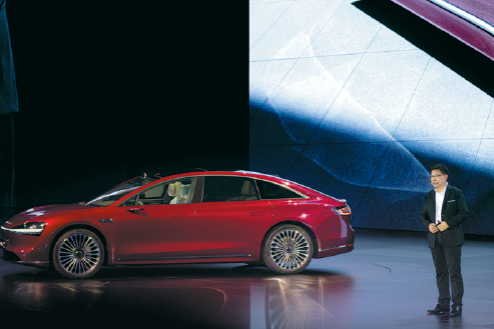Yu Chengdong, chairman of Huawei’s Intelligent Automotive Solution Business Unit, introduced the features of the Stellato S9 to audiences at the launch ceremony in Beijing on Tuesday. [Provided to China Daily]
Chinese technology giant Huawei and state-owned automaker Beijing Automotive Group last week launched the Stellato S9, aiming to move into a segment previously dominated by the Mercedes-Benz S-Class and BMW 7 Series.
Yu Chengdong, chairman of Huawei’s Intelligent Automotive Solution Business Unit, said he expects the large electric sedan to set a new benchmark in the premium executive sedan segment.
He said the Sterrato S9, with its 3,050-millimeter wheelbase, has more interior space, better acceleration and braking, less aerodynamic drag, smarter features and a smoother ride than luxury sedans from BMW and Mercedes-Benz — but at a much lower price. The Sterrato S9 comes in two models, Max and Ultra, priced from 399,800 to 449,800 yuan ($55,770 to $62,750).
Within 24 hours of its launch in Beijing on Tuesday, the car had received a total of 2,500 orders.
Beijing Automotive Chairman Zhang Jianyong said the state-owned automaker is “all-in” with the Stellato S9. Chinese-branded cars account for about 8 percent of the premium sedan segment, he said, adding that he hopes the Stellato S9 will change the status quo.
Mercedes-Benz’s largest shareholder, Beijing Automotive Group, produces Mercedes cars in China through a joint venture with the German brand.
The Stelato S9 is a car that both BAIC and Huawei cannot afford to fail, as they are walking a tough road.
BAIC, which relies on partnerships with Mercedes and Hyundai, is in desperate need of a domestically produced model that can prove its competitiveness in the NEV sector.
It was one of the first Chinese automakers to produce electric vehicles, but its lower-priced market positioning has not worked to its favor as a state-owned enterprise, and its premium brand, ArcFox, has struggled to turn around sales until recently.
Huawei’s first foray into the automotive industry with the AITO SUV, co-developed with Ceres, has been highly successful: cumulative sales of the brand’s three models reached 400,000 units in July. The flagship M9, unveiled in late 2023, has been the best-selling SUV priced above RMB 500,000 for several months in mainland China, with cumulative shipments exceeding 70,000 units.
But Huawei’s first foray into the sedan market has not been as successful as many expected: The Luxeed S7, a mid-size sedan developed jointly with Chinese automaker Chery Automobile, has only sold about 2,000 units.
Yu attributed the model’s underperformance to poor marketing.
Analysts said that now that the AITO has become competitive in the luxury SUV segment, if the Stelato can prove a hit in the luxury sedan segment, it will mean that Huawei has established itself as a leading automotive supplier of smart solutions.
A J.D. Power report released last week found that Chinese automakers place a high priority on in-car smart features such as voice assistants, real-time navigation and digital keys.
If the Stelato S9 is a hit, it will likely win Huawei further recognition and software orders from automakers vying for the attention of tech-savvy drivers in China, the world’s largest and most competitive market for electric smart cars.
To that end, the sedan is equipped with some of Huawei’s latest technologies, including an operating system shared with the company’s smartphones that provides smooth connectivity, the latest advanced driving systems, and cutting-edge features like reducing car sickness and isolating the driver from passenger conversations.
In its ambition to establish itself as a top automotive supplier, Huawei has established the Harmony Intelligent Mobility Alliance, whose members are automakers that adopt the company’s smart solutions.
In marketing, the HIMA name is typically affixed to the front of brands or models that Huawei co-develops with automakers, implying that the vehicle’s performance is enabled by Huawei, much like Intel does in the computing field.
The alliance includes four Chinese automakers: Ceres, Chery, BAIC and Jiangsu. Jiangsu, the only manufacturer whose partnership with Huawei hasn’t produced a car yet, said its first model is due to roll off the production line later this year. Huawei’s Yu said the model will rival Rolls-Royce.
In the first seven months of this year, the alliance’s cumulative deliveries reached 238,287 units, the majority of which were made possible by the AITO, jointly developed by Huawei and Ceres, a feat the other three companies hope to replicate.



